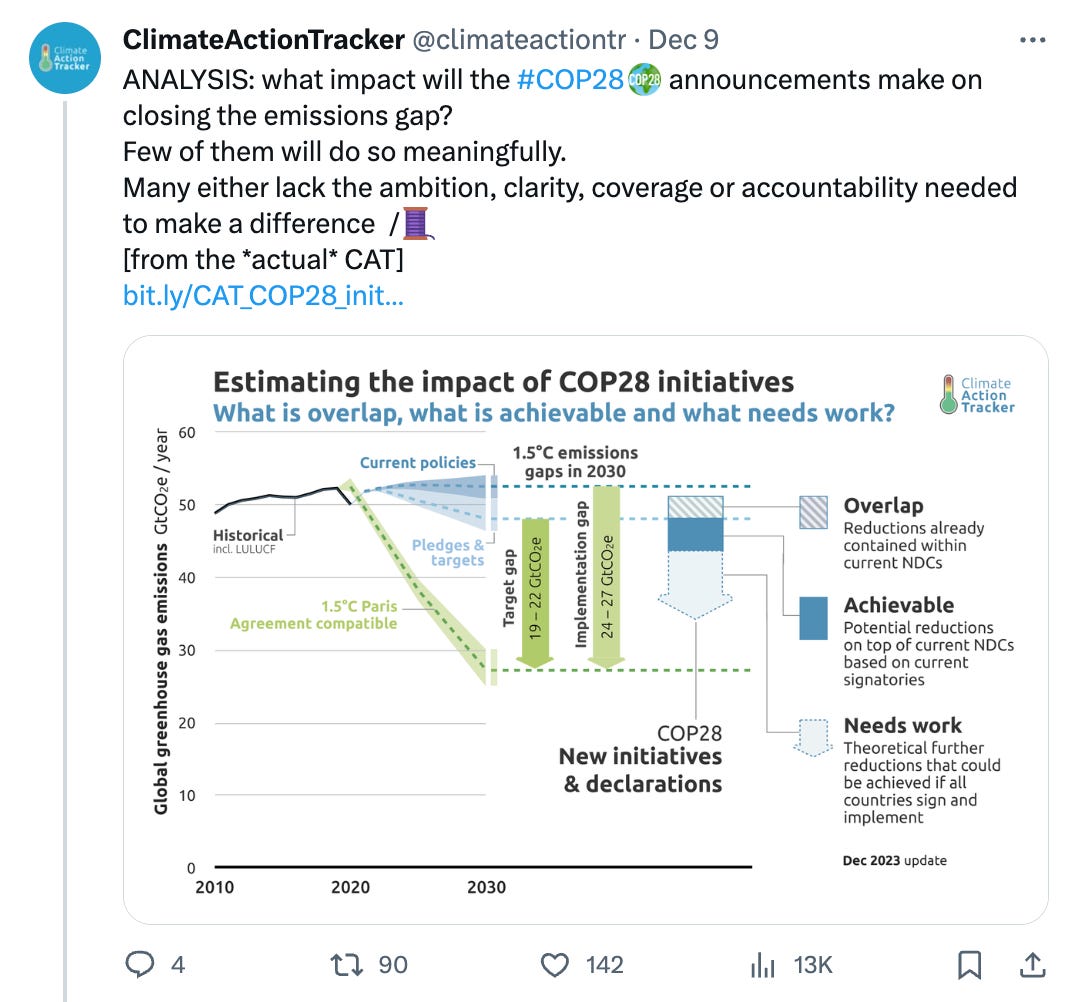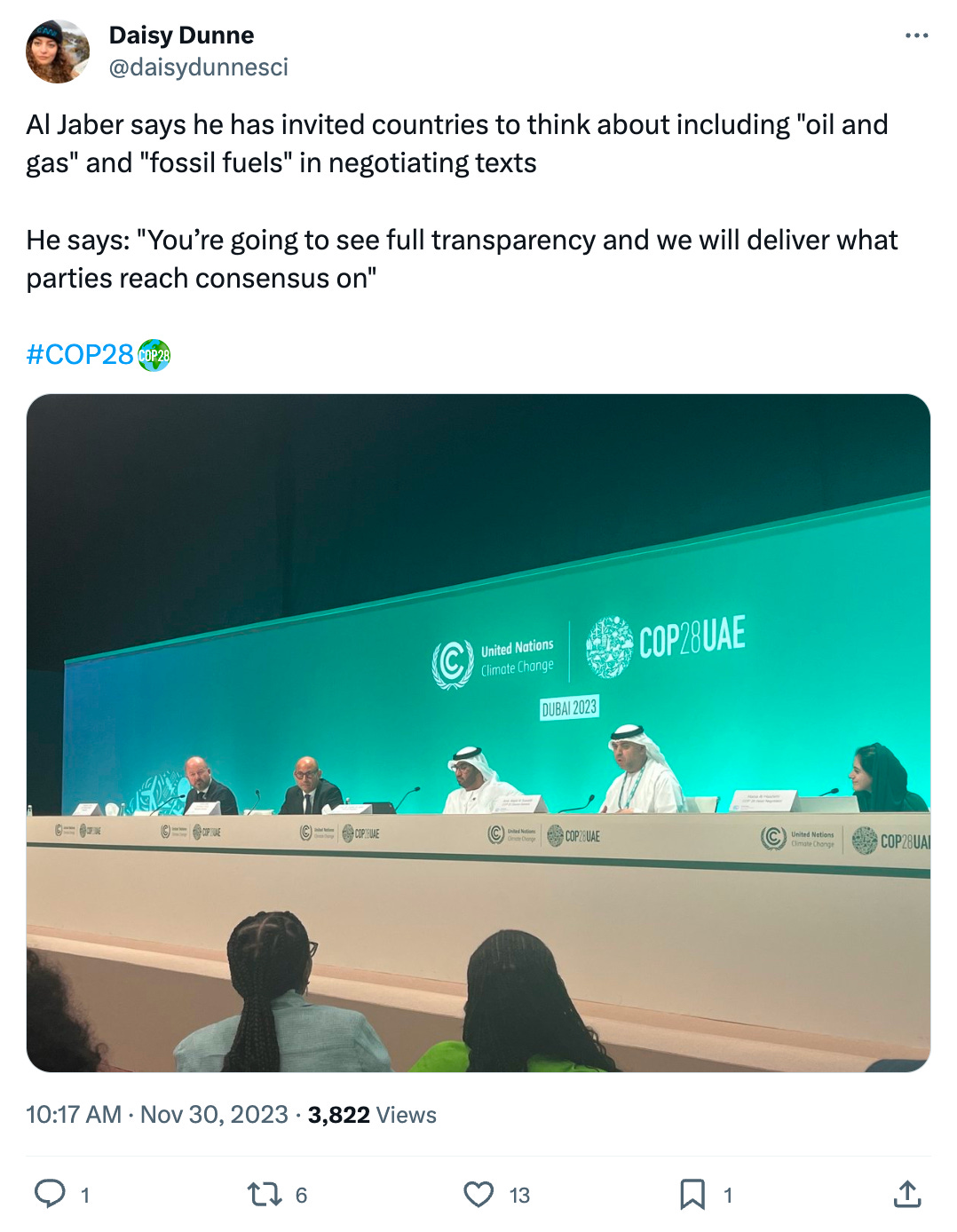The world’s climate conference COP28 concluded this week, with almost every country agreeing to “transition away from fossil fuels” for the first time in the conference’s history.
The conference has some notable controversies, including being hosted by a petro-state and alleged oil and gas negotiations being held behind closed doors.
Overall, the consensus seems to be excitement at the explicit mention of fossil fuels while remaining sceptical around whether the agreement goes far enough in binding nations to targets.
The tagline: we need a “just, orderly and equitable” energy transition.
What went down at COP28 🗞️
This is a summary of the UN’s view of the key outcomes of COP28, with some added thoughts from our side.
Overview of Achievements:
Over 170 announcements were captured at COP 28, more than double the number from COP 27.
The key takeaway was the mention of fossil fuel phaseouts, which was the first time COP had mentioned fossil fuels since talks began in 1995.
However, delegates had been working on a deal that would have called for the end of fossil fuels by 2050 (also the first time COP had explicitly put a date on the timeline rather than ‘mid-century’). Oil-producing countries like Saudi Arabia and its allies opposed the policy.
Implementation Focus:
Emphasis on the need for the implementation of pledges, declarations, and commitments made during the conference. Some climate activists said that these didn’t go far enough given the non-binding nature of the COP agreements (see Vox’s podcast here).
Initiatives launched should be operationalized, and progress must be reported and expanded towards their goals. As Carbon Brief wrote, this essentially “decides” on a “road map to mission 1.5C” run by the presidencies of COP28, COP29 and COP30 (UAE, Azerbaijan and Brazil, respectively). This will “stimulate ambition…action and implementation over this critical decade” to “[keep] 1.5C within reach”.
UNSG Initiatives:
The UN Secretary-General (UNSG) commissioned a meeting to discuss the implementation of recommendations by the High-Level Expert Group on Net-Zero Emissions Commitments of Non-State Entities.
The Taskforce on Net Zero Policy was launched to create a collaborative space for sharing knowledge among policymakers and regulators. As the UNPRI wrote, “the focus of the Taskforce will be to ensure the credibility and accountability of 1.5°C-aligned net zero emissions commitments by non-state actors is underpinned with coherent policies and regulatory certainty.”
Net-Zero Transition Charter:
COP 28 Presidency launched the Net-Zero Transition Charter for the Private Sector, urging organizations to make public net-zero emissions pledges and produce credible transition plans.
Accountability and Transparency:
Accountability is crucial for all actors in global climate action, and initiatives launched at COP 28 committed to reconvene at future COPs to discuss progress. Interestingly, as the Carbon Brief reported, “the NGO Corporate Accountability that found more than 160 attendees had a past record of pushing climate scepticism.”
Transparency is essential for accountability, and the UNFCCC secretariat will work with the COP 28 Presidency to bring transparency to initiatives through the Global Climate Action Portal.
Global Stocktake and Implementation Roadmap:
The first Global Stocktake concluded at the end of COP 28, marking the beginning of a new five-year cycle under the Paris Agreement.
The '2030 Climate Solutions: an Implementation Roadmap' was compiled, providing specific actions and insights from non-Party stakeholders.
For more details, see Carbon Brief’s pretty stellar report on everything that happened at & around COP28.
Week in Impact Articles ✍🏽
Monday: Climate reparations are becoming a reality. Here’s what they could look like.
Tuesday: Innovation in the UK power sector
Wednesday: Consumer Trends Report 2024: Dan Frommer
Thursday: Can Wegovy Fight Alcoholism? For Big Pharma, This Isn’t a Priority
Friday: Tesla recalls 2m vehicles after autopilot fears
3 Key Charts 📊
1. The only way is up: cost of healthcare in the US
2. Swapping out fats for protein: the early results of GLP-1s
3. UK’s largest energy startups by segment
Deal Capture 💰
Deals in the impact space across the UK and Europe
Cathera
Brain startup Cathera raised $5m Series B. Included Unorthodox Ventures.
Freya Biosciences
Immunotherapy tech Freya Biosciences raised $38m Series A. Co-led by Sofinnova and OMX.
I-Virtual
Telemedicine startup I-Virtual raised $3m. Included Elaia and UI Investissement.
Metafuels
Sustainable jet fuel company Metafuels raised $8m. Led by EIP and Contrarian.
Metcycle
Metals trading company Metcycle raised $5m. Included Project A and Partech.
Urban Sports Club
Employee wellness expansion Urban Sports Club raised E95m.
Woola
Sustainable packaging startup Woola raised E2.5m. Led by Metaplanet.
Getting in Touch 👋.
If you’re looking for funding, you can get in touch here.
Don’t be shy, get in touch on LinkedIn or on our Website 🎉.
We are open to feedback: let us know what more you’d like to hear about 💪.








